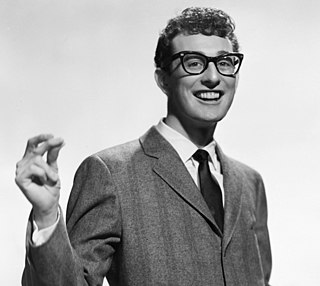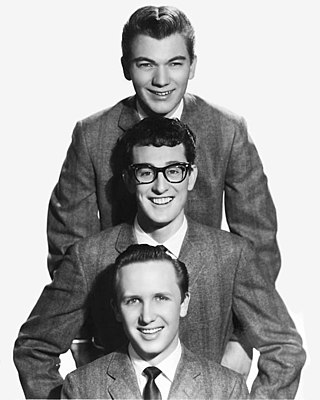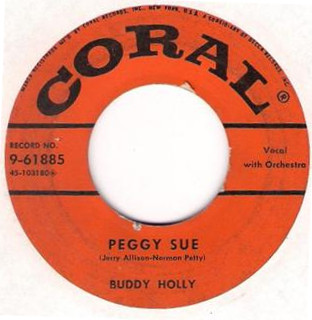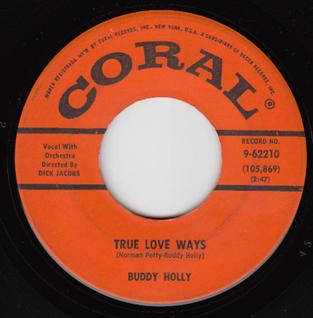
Charles Hardin Holley, known as Buddy Holly, was an American singer and songwriter who was a central and pioneering figure of mid-1950s rock and roll. He was born to a musical family in Lubbock, Texas during the Great Depression, and learned to play guitar and sing alongside his siblings. His style was influenced by gospel music, country music, and rhythm and blues acts, which he performed in Lubbock with his friends from high school.

The Crickets were an American rock and roll band from Lubbock, Texas, formed by singer-songwriter Buddy Holly in January 1957. Their first hit record, "That'll Be the Day", released in May 1957, peaked at number three on the Billboard Top 100 chart on September 16, 1957. The sleeve of their first album, The "Chirping" Crickets, shows the band line-up at the time: Holly on lead vocals and lead guitar, Niki Sullivan on rhythm guitar, Jerry Allison on drums, and Joe B. Mauldin on bass. The Crickets helped set the template for subsequent rock bands, such as the Beatles, with their guitar-bass-drums line-up, performing their own self-written material. After Holly's death in 1959 the band continued to tour and record into the 1960s and beyond with other band members through to the 21st century.

"That'll Be the Day" is a song written by Buddy Holly and Jerry Allison. It was first recorded by Buddy Holly and the Three Tunes in 1956 and was re-recorded in 1957 by Holly and his new band, the Crickets. The 1957 recording achieved widespread success. Holly's producer, Norman Petty, was credited as a co-writer, although he did not contribute to the composition.

The Hollies are a British rock and pop band, formed in 1962. One of the leading British groups of the 1960s and into the mid-1970s, they are known for their distinctive three-part vocal harmony style. Allan Clarke and Graham Nash founded the band as a Merseybeat-type group in Manchester, although some of the band members came from towns further north in East Lancashire. Nash left the group in 1968 to form Crosby, Stills & Nash, though he has reunited with the Hollies on occasion.

"Peggy Sue" is a rock and roll song written by Jerry Allison and Norman Petty, and recorded and released as a single by Buddy Holly on September 20, 1957. The Crickets are not mentioned on label of the single, but band members Joe B. Mauldin and Jerry Allison (drums) played on the recording. This recording was also released on Holly's eponymous 1958 album.

MPL Communications is the umbrella company for the business interests of Paul McCartney and was established in 1968. In addition to handling McCartney's post-Beatles work, MPL is one of the world's largest privately owned music publishers through its acquisition of other publishing companies.

Jerry Ivan Allison was an American musician, best known as the drummer for the Crickets and co-writer of their hits "That'll Be the Day" and "Peggy Sue", recorded with Buddy Holly. His only solo chart entry on the Billboard Hot 100 was "Real Wild Child", issued in 1958 under the name Ivan. Allison was inducted into the Rock and Roll Hall of Fame in 2012.

Buddy Holly is the debut studio album by Buddy Holly. It was released by Coral Records on February 20, 1958. The album collects Holly's four hit singles released on the Coral label; "Words of Love", "Peggy Sue", "I'm Gonna Love You Too", and "Rave On!". The backing group was Buddy Holly's band, the Crickets.

Buddy Holly recorded under several names and with several different backing bands. The Crickets played on almost all of his singles in 1957 and 1958.

"Heartbeat" is a rockabilly song originally recorded by Bob Montgomery and credited to Norman Petty. It was recorded most famously by Buddy Holly in 1958. The B-side of the single was "Well... All Right". "Heartbeat" reached the UK top 10 twice. Firstly in 1975 for Showaddywaddy at number 7 and again in 1992 for Nick Berry, recorded as the theme to the television series Heartbeat and reached number 2.

"Oh, Boy!" is a song written by Sonny West, Bill Tilghman and Norman Petty. The song was included on the album The "Chirping" Crickets and was also released as the A-side of a single, with "Not Fade Away" as the B-side. The song peaked at number 10 on the US charts, number 3 on the UK charts in early 1958, and number 26 in Canada.

Greatest Hits is a compilation album of songs taken from Buddy Holly's three original albums, The "Chirping" Crickets, Buddy Holly and That'll Be the Day, released in 1996 by MCA Records. It includes top ten hits "Peggy Sue" and "Oh, Boy!", along with number-one hit "That'll Be the Day".

"True Love Ways" is a song attributed to Norman Petty and Buddy Holly. Buddy Holly's original was recorded with the Dick Jacobs Orchestra in October 1958, four months before the singer's death. It was first released on the posthumous album The Buddy Holly Story, Vol. 2, in March 1960. The song was first released as a single in Britain in May 1960, reaching number 25 on the UK Singles Chart. It was released the following month in the US, but did not make the charts. In 1988, a UK re-release of the recording by MCA, the single reached no. 65 on the UK singles chart in a 5 week chart run.

"Maybe Baby" is a rock-and-roll song written by Buddy Holly and the producer Norman Petty, and recorded by Holly and the Crickets in 1957. The single, released in January 1958 and credited to the Crickets, was a Top 40 hit in the U.S., the UK, and Canada.

"Everyday" is a song written by Buddy Holly and Norman Petty, recorded by Buddy Holly and the Crickets on May 29, 1957, and released on September 20, 1957, as the B-side of "Peggy Sue", which went to three on the Billboard Top 100 chart in 1957. The song is ranked number 238 on Rolling Stone magazine's list of the "500 Greatest Songs of All Time".

The Buddy Holly Story is the first posthumously released compilation album by Buddy Holly and the Crickets. The album was released on February 28, 1959 by Coral Records less than a month after Holly's death.

"Peggy Sue Got Married" is a song written and performed by Buddy Holly. It was posthumously released in July 1959 as a 45-rpm single with "Crying, Waiting, Hoping". It refers to his 1957 hit song "Peggy Sue". It was one of the first sequels of the rock era.

"Raining in My Heart" is a song recorded by Buddy Holly on October 21, 1958 at the Pythian Temple on West 70th Street in New York City, with the orchestral backing by Dick Jacobs. The music and lyrics are written by the songwriting team of Felice Bryant and Boudleaux Bryant. It was released as a single on Coral Records in 1959, peaking at number 88 on the Billboard chart as the B-side of "It Doesn't Matter Anymore". This recording was included on Buddy Holly's first "greatest hits" compilation album, The Buddy Holly Story, that was released in March 1959.

In Style With the Crickets is a rock and roll album by the Crickets. Although it was the band's first release following the departure and subsequent death of their front man, Buddy Holly, it still contains many of the band's most memorable songs and many tracks have also been featured on numerous compilations over the years. Originally released as an LP record on December 5, 1960, the album remained out of print for some time until it was re-released on CD in 1993, with bonus tracks not featured on the original album.

"When You Ask About Love" is a song written by Jerry Allison and Sonny Curtis and recorded by the Crickets in 1959. It was a hit in the UK, reaching number 27 in the Singles Charts.



















